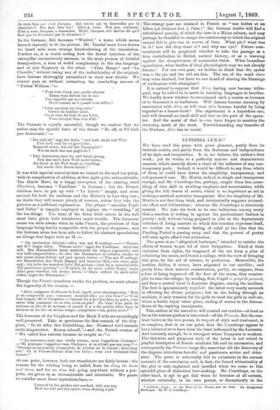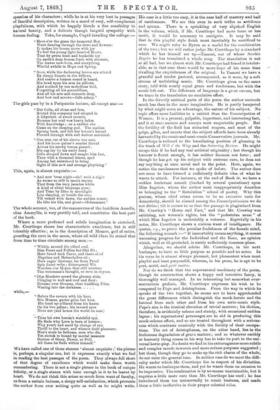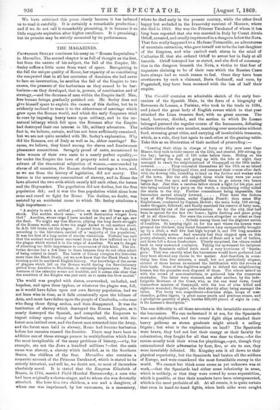LUDIBRIA LUN WE have read this poem with great pleasure,
partly from its intrinsic merits, and partly from the freshness and independence of its style and composition. It is, we believe, the author's first work ; yet he writes in a perfectly mature and characteristic manner, which scarcely shows a trace of the influence of any con- temporary poets. Indeed, it would be difficult to say from which of them he could have learnt his simplicity, transparency, and self-possessed ease. Mr. Morris, indeed, is simple and transparent enough, and Mr. Courthope has, perhaps, caught from him some- thing of that skill in avoiding emphasis and accentuation, while giving the full charm of metre, which is so important an aid in making a metrical narrative transparent. But the simplicity of Mr.
Morris is not free from trick, and involuntarily suggests anteced- ent effort and deliberation ; whereas Mr. Courthope is absolutely natural. We take his book to be one indication among many that a reaction is setting in against the predominant fashion in poetry ; and, without being prepared to join in the depreciatory criticism of living masters in which this reaction expresses itself, we confess to a certain feeling of relief at the idea that the Puzzling Period is passing away, and that the perusal of poetry will once again afford real relaxation.
The poem is an "allegorical burlesque," intended to satirize the efforts of women to get rid of their Subjection. Tired of their exclusion from rights, the vanguard of the sex form a plan of colonizing the moon, and found a college, with the view of bringing this plan, by the aid of science, to perfection. Meanwhile, the heathen deities, it seems, have migrated to our satellite ; and partly from their natural conservatism, partly, we suppose, from a fear of being improved off the face of the moon, they counter- plot to ruin the college, by sending, first, Cupid in proprid persona, and then a mortal lover in feminine disguise, among the maidens. The first is ignominiously repelled : the latter very nearly succeeds in effecting the divine purposes ; but he too failing through an accident, it only remains for the gods to meet the girls in mid-air, where a battle royal takes place, ending of course in the discom- fiture of the aspiring immigrants.
This outline of the narrative will remind our readers—at least so far as the terrene portion is concerned—of the Princess. But the con- trast between the two poems, in respect of style and treatment, is so complete, that in no one point does Mr. Courthope appear to have imitated or to have been the least influenced by the Laureate.
And curiously enough, he is strongest where Tennyson is weakest.
The elaborate and pregnant style of the latter is not suited to playful description of female academic life and its accessories, and
consequently the Princess hangs fire somewhat till the discovery of the disguise introduces forceful and passionate action and utter- ance. The poem is universally felt to culminate in the earnest counsels of the conclusion, and, in fact, the forced whimsicality of the plot is only explained and justified when we come to this splendid piece of dialectical love-making. Mr. Courthope, on the other hand, is apt to get dull when he becomes at all earnest, whether satirically, in his own person, or dramatically in the
• Ludibria Lanz ; or, the Wars of the Women and the Gods. An Allegorical Burlesque. By W. J. Courthope.
speeches of his characters ; while he is at his very best in passages of fanciful description, written in a mood of easy, self-complacent playfulness, with which he happily blends a fine sensibility to natural beauty, and a delicate though languid sympathy with human feeling. Take, for example, Cupid invading the college :—
" Here o'er the grass the immortal Boy Went dancing through the dews and flowers: It makes his bosom move with joy To feel the young light-hearted Hours, That by green bush and bankside toy On earth's deep bosom fresh with showers, The leaves new-born, and everything Wistful awhile in Hope and Spring.
"Soon, while the darkening leaves are stirred By sleepy linnets in the willows, And scarce a human sound is heard, His head upon his arm he pillows, And soothed by one melodious bird, Forgetting all his peccadilloes, And all his arts and counsels deep,
And bow and arrows—falls asleep."
The girls pass by in a Peripatetic lecture, all except one :— "But Celia, all alone and free,
Behind this company had strayed in A labyrinth of sweet reverie, Because her soul was heavy laden With knowledge ; on a sudden she Came on the sleeping god. The maiden Sprang back, and felt her bosom's kernel Pierced through with soft desires maternal.
"one arm out of his sleeve was cast, And his loose quiver's scarlet thread Across his snowy bosom passed ; His cap lay by his curly head. Celia stooped down and caught him fast, Then with a thousand kisses, aped Among her sisterhood to bring Sight of this new and strange plaything."
This, again, is almost exquisite :— " And now 'twas night—oh! such a night
As seems so still in man's repose, That from the very jasmine white A kind of silent language goes; And Time by lilies in moonlight Lies Bleeping, or beside the rose, Till waked with dawn, the sudden comer, He lifts his lids, and great—Midsummer."
The whole account, too, of the manoeuvres of the insidious Amadis, alias Amaryllis, is very prettily told, and constitutes the best part of the book.
Where a more profound and subtle imagination is exercised, Mr. Courthope shows less characteristic excellence, but is still tolerably effective ; as in the description of Momus, god of satire, guarding the cave in the moon, where all wild ideas lie stored that from time to time circulate among men :—
"Within, around the rifted roof, Dim Fears and Follies bat-like flit ; Here brood dark Cares, and there aloof Megrims and Melancholies sit ; Here sages' Systems, far from Proof Spin finest webs ; distempered Wit Watches o'er Hopes, that still mistime The statesman's thought, or rave in rhyme.
"Dim Shadows crowd the gloomy aisle, Clinging to wall and roof and floor ; Dreams over Dreams, close huddling Files,
Waning into the darkness while,—
" Before the cavern with his keys Sits Moms, gaoler grim but wise, His head up-pillared from his knees On his two palms; his inward eyes Move not (and hence the world he sees) "Thus his own bosom's watchful spy, He finds why Love is born of leisure ; Why youth and maid by change of eye Thrill to the heart, and whence their pleasure; Men's souls he fathoms, men who die,
Yet shrink to bound by mortal measure
Desires of Glory, Power, or Pelf, All these he finds within himself."
We have called one of these stanzas 'almost exquisite the phrase is, perhaps, a singular one, but it expresses exactly what we feel in reading the beat passages of the poem. They always fell short of that degree of excellence which would make them worth remembering. There is not a single phrase in the book of unique felicity, or a single stanza with tune enough in it to be learnt by heart. We do not think this arises so much from want of faculty, as from a certain laziness, a sleepy self-satisfaction, which prevents the author from ever writing quite as well as he might write. His ease is a little too easy, it is the ease half of mastery and half of carelessness. We see this even in such trifles as accidence and syntax. There is a sprinkling of very slipshod English in the volume, which, if Mr. Courthope had more fame or less merit, it would be necessary to castigate. It may be said that in this playful style finish must inevitably be sacrificed to ease. We might refer to Byron as a model for the combination of the two ; but we will rather judge Mr. Courthope by a standard which he has himself set up—Tassoni, out of whose Secchia Rapita he has translated a whole song. The translation is not at all bad, but we almost wish Mr. Courthope had found it intoler- able, as in that case there would be more hope of his some time rivalling the exquisiteness of the original. In Tassoni we have a graceful and tender pastoral, accompanied, as it were, by a soft stream of undulating music. Mr. Courthope gives us the same story, told iith nearly equal grace and tenderness, but with the musie left out. The difference of language is a great excuse, but we trace in the translation no emulative effort.
In the directly satirical parts of the poem the author succeeds much less then in the more imaginative. He is partly hampered by what might seem an advantage, the nature of his subject. No topic offers more facilities to a satirist than the Emancipation of Women. It is a present, palpable, important, and interesting fact, and it at once amuses and annoys most respectable people. But the fertility of the field has attracted reapers, and most of the quips, gibes, and taunts that the subject affords have been already harvested by the comic and semi-comic Conservative journals. Mr. Courthope is reduced to the humiliating position of gleaning in the track of Will a' the Wisp and the Saturday Review. He might escape this if he had any real satirical originality ; but though his humour is fluent enough, it has neither fineness nor force ; and though he has got up his subject with extreme care, he does not say anything at once novel and to the point. Here, again, we notice the carelessness that we spoke of before. The author does not seem to have formed a sufficiently definite idea of what he wants to attack. For instance, at the end of Book iv. we have a sudden irrelevant assault (backed by several quotations) upon Miss Iugelow, whom the author most inappropriately describes as belonging to the " Revolution" school of poetry. Why this poetess, whose chief crime seems to be an excessive taste for domesticity, should be classed among the Emancipationists we do not divine ; till it occurs to us that the passage is plagiarized from Mr. Crawley's "Horse and Foot," and that Mr. Crawley was satirizing, not women's rights, but the "pedestrian muse" of which Miss Ingelow is undeniably a votaress. Especially in his notes, Mr. Courthope shows a curious want of intelligence. He quotes, e.g., to prove the peculiar foolishness of the female mind, the following remark :—" If immortality means anything, it means unceasing progress for the Individual and the Race, an opinion which, well or ill-grounded, is surely sufficiently common-place.
Altogether, we should advise Mr. Courthope, in his next burlesque, to have as little purpose as possible and no notes. In his verse he is almost always pleasant, but pleasantest when most playful and least purposeful, whereas, in his prose, he is apt to be pert, acrid, and petit maitre.
Nor do we think that the supernatural machinery of the poem, though its construction shows a happy and inventive fancy, is thoroughly well managed. In an interesting but somewhat over- sententious preface, Mr. Courthope expressos his wish to be compared to Pope and Aristophanes. From the way in which he speaks of the two together, he seems not to have apprehended the great differences which distinguish the mock-heroic and the farcical from each other and from his own serio-comic style. Pope's aim is the ironical elevation of trivial matters ; his diction, therefore, is artificially solemn and stately, with occasional sudden lapses ; his supernatural personages are to aid in producing this mock-solemn effect, and so are treated throughout with a serious- ness which contrasts comically with the futility of their occupa- tions. The art of Aristophanes, on the other hand, lies in the frolicsome degradation of grave matters ; and so whatever earthly or heavenly thing comes in his way has to take its part in the uni- versal horse-play. No doubt we find in his extravaganzas more subtle and complex moods iuwoven and more serious purposes suggested ; but these, though they go to make up the rich charm of the whole, do not raise the general tone. In neither case do we meet the diffi- culty under which Mr. Courthope lies in respect of his divinities. He wants to burlesque them, and yet he wants them on occasion to be impressive. The combination is by no means unattainable, but it requires a little more care than Mr. Courthope has used ; he has introduced them too unreservedly to comic business, and made them a little ineffective in their proper celestial roles.
We have criticized this poem closely because it has induced us to read it carefully. It is certainly a remarkable production ; and if we do not call it remarkably promising, it is because it so little suggests aspiration after higher excellence. It is promising ; but its promise may be strictly measured by its performance.
































 Previous page
Previous page